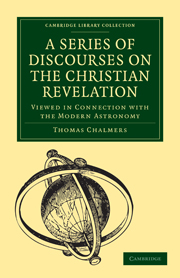Book contents
- Frontmatter
- PREFACE
- Contents
- DISCOURSE I A SKETCH OF THE MODERN ASTRONOMY
- DISCOURSE II THE MODESTY OF TRUE SCIENCE
- DISCOURSE III ON THE EXTENT OF THE DIVINE CONDESCENSION
- DISCOURSE IV ON THE KNOWLEDGE OF MAN'S MORAL HISTORY IN THE DISTANT PLACES OF CREATION
- DISCOURSE V ON THE SYMPATHY THAT IS FELT FOR MAN IN THE DISTANT PLACES OF CREATION
- DISCOURSE VI ON THE CONTEST FOR AN ASCENDENCY OVER MAN, AMONGST THE HIGHER ORDERS OF INTELLIGENCE
- DISCOURSE VII ON THE SLENDER INFLUENCE OF MERE TASTE AND SENSIBILITY, IN MATTERS OF RELIGION
- APPENDIX
DISCOURSE III - ON THE EXTENT OF THE DIVINE CONDESCENSION
Published online by Cambridge University Press: 29 August 2010
- Frontmatter
- PREFACE
- Contents
- DISCOURSE I A SKETCH OF THE MODERN ASTRONOMY
- DISCOURSE II THE MODESTY OF TRUE SCIENCE
- DISCOURSE III ON THE EXTENT OF THE DIVINE CONDESCENSION
- DISCOURSE IV ON THE KNOWLEDGE OF MAN'S MORAL HISTORY IN THE DISTANT PLACES OF CREATION
- DISCOURSE V ON THE SYMPATHY THAT IS FELT FOR MAN IN THE DISTANT PLACES OF CREATION
- DISCOURSE VI ON THE CONTEST FOR AN ASCENDENCY OVER MAN, AMONGST THE HIGHER ORDERS OF INTELLIGENCE
- DISCOURSE VII ON THE SLENDER INFLUENCE OF MERE TASTE AND SENSIBILITY, IN MATTERS OF RELIGION
- APPENDIX
Summary
“Who is like unto the Lord our God, who dwelleth on high. Who humbleth himself to behold the things that are in heaven, and in the earth!”
—Psalm cxiii. 5, 6.In our last Discourse, we attempted to expose the total want of evidence for the assertion of the infidel astronomer—and this reduces the whole of our remaining controversy with him, to the business of arguing against a mere possibility. Still, however, the answer is not so complete as it might be, till the soundness of the argument be attended to, as well as the credibility of the assertion—or, in other words, let us admit the assertion, and take a view of the reasoning which has been constructed upon it.
We have already attempted to lay before you, the wonderful extent of that space, teeming with unnumbered worlds, which modern science has brought within the circle of its discoveries. We even ventured to expatiate on those tracks of infinity, which, lie on the other side of all that eye or that telescope hath made known to us—to shoot afar into those ulterior regions, which are beyond the limits of our astronomy—to impress you with the rashness of the imagination, that the creative energy of God had sunk exhausted by the magnitude of its efforts, at that very line, through which the art of man, lavished as it has been on the work of perfecting the instruments of vision, has not yet been able to penetrate;
- Type
- Chapter
- Information
- A Series of Discourses on the Christian Revelation, Viewed in Connection with the Modern Astronomy , pp. 94 - 125Publisher: Cambridge University PressPrint publication year: 2009First published in: 1817



